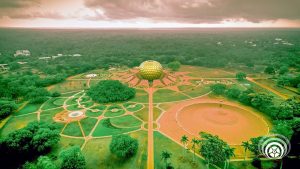The aspiration for human unity has been a fundamental pursuit throughout the history of human civilization. From ancient civilizations to modern societies, the dream of a world united in peace and harmony has persisted. Auroville, founded by The Mother and Sri Aurobindo in 1968, stands as a living example of an ongoing experiment in realizing this aspiration. However, the journey towards human unity is beset with challenges, as it necessitates a profound transformation of the human psyche.
The Difficulties of the Mental Being: In Sri Aurobindo’s writings, particularly in “The Synthesis of Yoga,” the challenges of achieving human unity are elaborated upon. He points out that the human being is grounded in separated multiplicity, even when attempting to master division and fragmentation. There exists a veil and a lid, preventing humans not only from attaining but even from truly knowing the divine.
Realized mental being and realized spiritual being are two distinct planes of existence. The former is characterized by mental being, vital being, and physical being, representing human principles. In contrast, the latter encompasses infinite being, consciousness, will, bliss, and comprehensive knowledge of the supermind, representing divine principles. These two planes seem opposed to each other in their apparent nature.
The Divine and the Human: The divine is infinite and immortal, while the human is limited by time, scope, and form, often being a life that is essentially death attempting to transform into life that is immortality. Bridging this gap between the divine and the human is at the core of the quest for human unity.
The Formation of the Nation-Unit – The Three Stages: Sri Aurobindo also discusses the evolution of the nation-type, highlighting three stages of development. The first stage involves the creation of a new form of unity from complex and heterogeneous materials, mainly through external processes. The second stage emphasizes stringent organization and central control. Finally, the third stage calls for free internal development, ensuring the growth and formation of the organism.
Interestingly, various societies across Europe and Asia have independently evolved social hierarchies based on spiritual function, political domination, and economic roles. This commonality underscores the human tendency to seek unity through organized structures.
Knowledge and Ignorance: Sri Aurobindo’s teachings emphasize the inherent multiplicity within unity. He discusses Brahman, the Lord, as both one and all-blissful, capable of conceiving multiple forms and energies. This multiplicity within unity is integral to the divine’s expression in the world.
A League of Nations: The idea of a golden age of mankind and the belief in the return to an ideal state are themes found in various traditions worldwide. The human mind often oscillates between glorifying the past and projecting ideals onto the future. The concept of a better, more unified future has persisted throughout history, driving human progress and evolution.
Love and the Triple Path: Sri Aurobindo introduces the three divine powers in human nature: will, knowledge, and love. While the path of Bhakti is often considered inferior due to its dualistic nature, it also represents the love and joy of union. Unity, experienced as joyful love, is a central theme in the journey towards human unity.
7 May 1912: Sri Aurobindo’s vision for human unity revolves around the realization of inner divinity within all individuals, leading to unity and the establishment of the Kingdom of God on Earth. This vision seeks to unite humanity in a harmonious, ideal society.
The pursuit of human unity is a complex and multifaceted endeavor. Sri Aurobindo’s teachings and Auroville’s ongoing journey demonstrate that achieving unity involves a transformation of human consciousness and an embrace of diversity within unity. It requires reconciling dualities and transcending limitations to realize the profound interconnectedness of all existence.
Auroville’s journey towards human unity is a testament to the enduring human aspiration for oneness. While challenges persist, the path laid out by Sri Aurobindo offers profound insights into the nature of unity and the potential for humanity to overcome its divisions. As we continue to grapple with these challenges, Auroville remains a beacon of hope, reminding us of the transformative power of unity in diversity.



